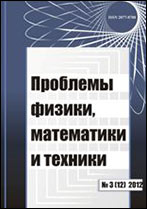|
|
Problemy Fiziki, Matematiki i Tekhniki (Problems of Physics, Mathematics and Technics), 2019, Issue 3(40), Pages 40–42
(Mi pfmt652)
|
 |
|
 |
PHYSICS
A massive gravitational field in flat spacetime. III. Gravitational dependence of radioactive decay
M. A. Serdyukova
F. Scorina Gomel State University
Abstract:
It is shown that a change in the inertial mass of unstable particles (and atomic nuclei) in a scalar gravitational field that occurs as a result of the transfer of part of the rest energy of particles to the field, or, conversely, when their rest energy increases due to accretion of field energy, is accompanied by a change in the rate of radioactive decay. The application of the scalar theory of gravity to the homogeneous universe predicts the secular acceleration of the rate of decay of unstable nuclei and particles in the current era. On a cosmological time scale, this process is confirmed by the observed (1+z)-stretching of the light curves of supernovae type Ia afterglow caused by the hard gamma-radiation from the decaying unstable 56Ni and 56Co nuclides created by the explosion of accreting white dwarfs.
Keywords:
spinless massive gravity, variable mass, radioactive decay.
Received: 03.06.2019
Citation:
M. A. Serdyukova, “A massive gravitational field in flat spacetime. III. Gravitational dependence of radioactive decay”, PFMT, 2019, no. 3(40), 40–42
Linking options:
https://www.mathnet.ru/eng/pfmt652 https://www.mathnet.ru/eng/pfmt/y2019/i3/p40
|

| Statistics & downloads: |
| Abstract page: | 124 | | Full-text PDF : | 53 | | References: | 22 |
|




 Contact us:
Contact us: Terms of Use
Terms of Use
 Registration to the website
Registration to the website Logotypes
Logotypes









 Citation in format
Citation in format 